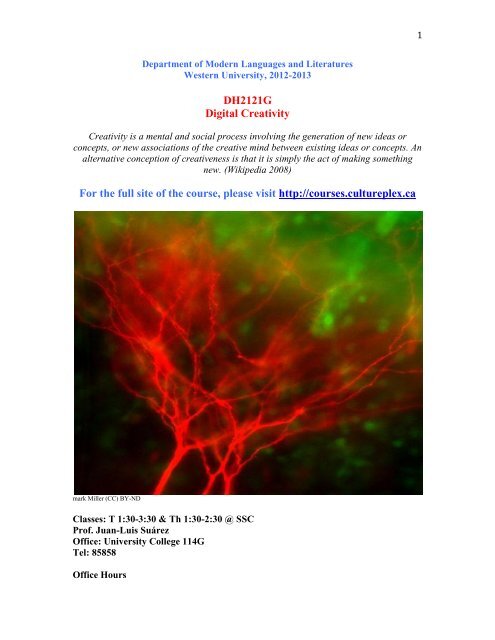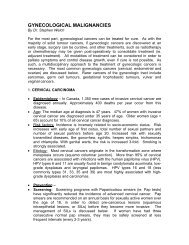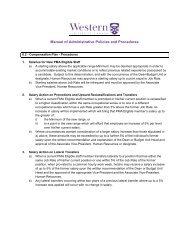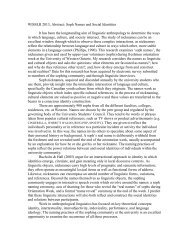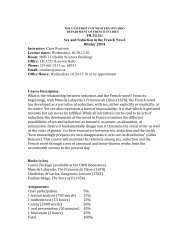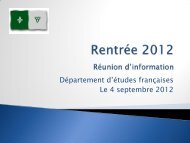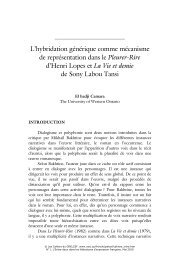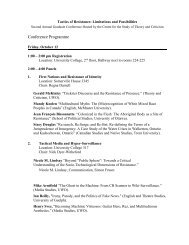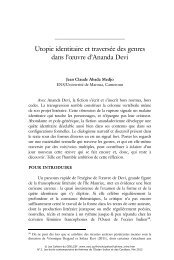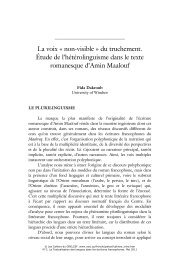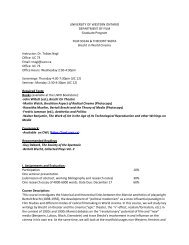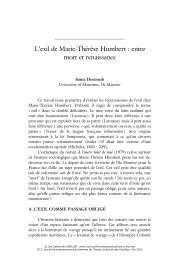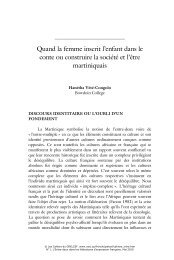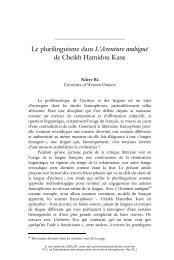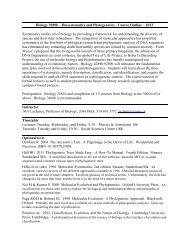Digital Humanities 2121G - University of Western Ontario
Digital Humanities 2121G - University of Western Ontario
Digital Humanities 2121G - University of Western Ontario
Create successful ePaper yourself
Turn your PDF publications into a flip-book with our unique Google optimized e-Paper software.
1<br />
Department <strong>of</strong> Modern Languages and Literatures<br />
<strong>Western</strong> <strong>University</strong>, 2012-2013<br />
DH<strong>2121G</strong><br />
<strong>Digital</strong> Creativity<br />
Creativity is a mental and social process involving the generation <strong>of</strong> new ideas or<br />
concepts, or new associations <strong>of</strong> the creative mind between existing ideas or concepts. An<br />
alternative conception <strong>of</strong> creativeness is that it is simply the act <strong>of</strong> making something<br />
new. (Wikipedia 2008)<br />
For the full site <strong>of</strong> the course, please visit http://courses.cultureplex.ca<br />
mark Miller (CC) BY-ND<br />
Classes: T 1:30-3:30 & Th 1:30-2:30 @ SSC<br />
Pr<strong>of</strong>. Juan-Luis Suárez<br />
Office: <strong>University</strong> College 114G<br />
Tel: 85858<br />
Office Hours
2<br />
Monday,<br />
11:00-12:00<br />
Élika Ortega<br />
Face to Face UC<br />
114<br />
Tuesday,<br />
11:00-12:00<br />
Javier de la Rosa<br />
Google HangOut:<br />
versae@gmail.com<br />
Wednesday<br />
Thursday,<br />
2:30-3:30<br />
Face to Face UC<br />
114<br />
Friday<br />
Description<br />
Study creativity and innovation where it happens! Grounded in contemporary theories <strong>of</strong><br />
creativity, you will examine actual cases <strong>of</strong> innovation in fields like sports, fashion,<br />
cooking, theater and the Internet. Students will learn how to transform a creative idea into<br />
a business plan.<br />
Renée S. (CC) BY-NC-ND/Charis Tsevis (CC) BY-NC-ND/Wen-Cheng Liu (CC) BY-NC-ND<br />
Methodology and Student’s Work<br />
This is a flip course, i.e., we will use classroom time to comment and debate ideas from<br />
readings and videos, to show and explain actual examples <strong>of</strong> creative persons and<br />
institutions, to listen to invited guests, and to learn how to turn an idea into a viable<br />
business plan. The reading and the study happen on your own time, you organize it<br />
according to the class schedule, and it is your responsibility. Of course, all questions and<br />
doubts that you might have will be discussed in class.<br />
Course Objectives<br />
Introduce the student to the main theories and concepts <strong>of</strong> creativity and<br />
innovation<br />
Make the student aware <strong>of</strong> the environment and attitudes conducive to creation<br />
Analyze the environment in which real organizations have to solve problems<br />
Develop the ability to solve real problems and to design a plan for your project<br />
Learning Outcomes<br />
Development <strong>of</strong> a simple business plan<br />
Knowledge <strong>of</strong> main theories <strong>of</strong> creativity and innovation<br />
Acquaintance with some special cases <strong>of</strong> individuals and organizations renown<br />
for their creative endeavors<br />
Practical and theoretical skills to tackle real problems <strong>of</strong> real organizations<br />
Application <strong>of</strong> your creative intuition to a digital technology<br />
Activities:<br />
Reading and watching all materials before coming to class<br />
Quizzes on videos on course’s web site<br />
Class discussions and online forum
3<br />
<br />
<br />
<br />
<br />
<br />
Playing and solving activities on Dr. Glearning’s mobile app (if you do not have a<br />
smart-phone or tablet, the CulturePlex Lab @UC 114 will make them available to<br />
you during <strong>of</strong>fice hours). Download at www.drglearning.com, from the App Store<br />
or GooglePlay<br />
Personal Business Plan (what and how you will be doing in 3 years)<br />
The Case <strong>of</strong> the Stratford Festival <strong>of</strong> Canada (this is a team activity)<br />
RBC and the Global Competitiveness Challenge (this is a team activity)<br />
Writing ‘in’ Augmented Reality (a personal essay using AR)<br />
Roland Tanglao (CC) BY<br />
Grade Distribution<br />
Playing and solving activities on Dr. Glearning’s mobile app: 20% (2% x 10 levels)<br />
Quizzes on videos on course’s web site: 10%<br />
Personal Business Plan: 15%<br />
The Case <strong>of</strong> the Stratford Festival <strong>of</strong> Canada (this is a team activity): 20%<br />
RBC and the Global Competitiveness Challenge (this is a team activity): 20%<br />
Writing ‘in’ Augmented Reality (a personal essay using AR): 15%<br />
Content<br />
Week 1. 8/10 January<br />
Topic: Concepts <strong>of</strong> Creativity<br />
Materials:<br />
Robert J. Sternberg, Todd I. Lubart: “The Concept <strong>of</strong> Creativity: Prospects and<br />
Paradigms” in Sternberg, R.J., ed., Handbook <strong>of</strong> Creativity.<br />
Creativity on Think Quarterly<br />
Frank Ghery & Thomas Pritzker at THiNK 2011
4<br />
<br />
Talent Search TED@ New York Phil Hansen: The art <strong>of</strong> the imperfect<br />
Phil Hansen’s Website<br />
Extra:<br />
<br />
Albert, R.S. & Runce, M.A. (1999). “A History <strong>of</strong> Research on Creativity” in Sternberg,<br />
R.J., ed., Handbook <strong>of</strong> Creativity.<br />
Irving Singer: Modes <strong>of</strong> Creativity. Philosophical Perspectives, chaps. 3, 4.<br />
Jonah Lehrer: Imagine. How Creativity Works, chap. 2.<br />
Starchitect: Frank Gehry Documentary<br />
Week 2. 15/17 January<br />
Topic: A Personal Business Plan<br />
Materials:<br />
Thomas H. Byers et al.: Technology Ventures: From Idea to Enterprise, chaps. 1.1, 1.2,<br />
1.5, 2.1, 2.2, 3.1 to 3.5.<br />
Randy Komisar: The Monk and the Riddle. The Art <strong>of</strong> Making a Living, chaps. 1, 2, 3.<br />
Alexander Osterwalder and Yves Pigneur: Business Model Generation. A Handbook for<br />
Visionaries, Game Changers, and Challengers, sections “Canvas” and “Design”.<br />
Business Model Canvas Explained<br />
Lean Canvas – Your Startup Blueprint<br />
Why Lean Canvas?<br />
Combine and Share Ideas - Instagram c<strong>of</strong>ounders on Startup Ideas<br />
Assignment #1 Starts. Due Jan 29: A Personal Business Plan with Lean Canvas (individual)<br />
Week 3. 22/24 January<br />
Topic: Agile Project Management<br />
Materials:<br />
The Agile Manifesto<br />
The Agile Warrior<br />
Scrum Alliance. Head Inception Deck<br />
Agile Project Initiation Techniques – The Inception Deck and Boot Camp<br />
Week 4. 29/31 January<br />
Topic: Cognition and Creativity<br />
Materials:<br />
Creativity and The Brain<br />
The Creative Brain<br />
Colin Martindale: “Biological Bases <strong>of</strong> Creativity” in Sternberg, R.J., ed., Handbook <strong>of</strong><br />
Creativity.<br />
Balzac, Fred (2006). "Exploring the Brain's Role in Creativity". NeuroPsychiatry Reviews<br />
7 (5): 1, 19–20.<br />
Kraft, U. (2005). "Unleashing Creativity". Scientific American Mind April: 16–23.<br />
<br />
Extra:<br />
<br />
McCrae, R.R. (1987). "Creativity, Divergent Thinking, and Openness to Experience".<br />
Journal <strong>of</strong> Personality and Social Psychology 52 (6): 1258–1265. doi:10.1037/0022-<br />
3514.52.6.1258.<br />
Jonah Lehrer: How Creativity Works
5<br />
Vandervert, L. (2003). “The neurophysiological basis <strong>of</strong> innovation”. In L. V. Shavinina<br />
(Ed.) The international handbook on innovation (pp. 17-30). Oxford, England: Elsevier<br />
Science.<br />
Assignment #2 Starts. Due Feb 26: The case <strong>of</strong> the Stratford Festival <strong>of</strong> Canada (teams)<br />
Guest Speaker: Ronen Benin, Co-founder & CEO <strong>of</strong> Coachd Inc.<br />
Week 5. 5/7 February<br />
Topic: Design Thinking<br />
Materials:<br />
Nigel Cross: Design Thinking. Understanding How Designers Think and Work, chaps 1,<br />
2, 4, 7.<br />
<br />
<br />
Stanford Design Thinking Process<br />
Ed Catmull: “How Pixar Fosters Collective Creativity.” Harvard Business Review,<br />
September 2008.<br />
Extra:<br />
Tim Brown urges designers to think big<br />
About Valve, video-games company and its philosophy:<br />
o Valve Handbook for New Employees<br />
o An article: Is Valve Too Good to be True?<br />
Guest Speaker: Anita Gaffney, Executive Director <strong>of</strong> the Stratford Festival <strong>of</strong> Canada<br />
Week 6. 12/14 February<br />
Topic: The Innovation Engine<br />
Materials:<br />
Tina Seelig: inGenius. A Crash Course on Creativity, chaps. Introduction, 1 to 3, 9 to 11.<br />
Innovation on Think Quarterly<br />
Ben Austen: “Do You Really Want to be Like Steve Jobs?” Wired, August 2012, 73-79.<br />
Extra:<br />
<br />
A Crash Course in Creativity: Tina Seelig at TEDxStanford<br />
Guest Speaker: Matt Rendall, Co-founder & CEO <strong>of</strong> ClearPath Robotics<br />
Week 7. 26/28 February<br />
Topic: Social Innovation<br />
Materials:<br />
Frances Westley, Brenda Zimmerman and Michael Quinn Patton: Getting to Maybe. How<br />
the World is Changed, chaps. 1, 2, 3, 8.<br />
“After elBulli: Ferran Adrià on his desire to bring innovation to all” Wired UK, October<br />
2012.<br />
Extra:<br />
El Bulli: Cooking in Progress (2011) Official Trailer (full film available in UC 1)<br />
Assignment #3 Starts. Due March 26: RBC and the Global Competitiveness Challenge (teams)<br />
Week 8. 5/7 March<br />
Topic: Assignment #1 Pitches (2 minutes)<br />
Guest: Anita Gaffney, Executive Director <strong>of</strong> the Stratford Festival <strong>of</strong> Canada
6<br />
Week 9. 12/14 March<br />
Topic: Networks <strong>of</strong> Innovation<br />
Materials:<br />
Ilkka Tuomi: “Innovation as Multifocal Development <strong>of</strong> Social Practice”, “Socio-<br />
Cognitive Spaces <strong>of</strong> Innovation and Meaning Creation”, and “Breaking through a<br />
<br />
Technological Frame” in Networks <strong>of</strong> Innovation.<br />
William Illsey Atkinson: “Heartland: The Rebirth <strong>of</strong> <strong>Ontario</strong>”. Prototype. How Canadian<br />
Innovation is Shaping the Future.<br />
"The Secret History <strong>of</strong> Silicon Valley," Steve Blank, Nov 20, 2008.<br />
It's Not the People You Know. It's Where You Are, Randall Stross, NYT, Oct 22, 2006.<br />
"When it Comes to Innovation, Geography is Destiny," Pascal Zachary, NYT, Feb 11,<br />
2007.<br />
Guest: Joel Adams, Entrepreneur<br />
Week 10. 19/21 March<br />
Topic: The Creative Class<br />
Materials:<br />
Richard Florida: “The Creative Age”, “Managing Creativity”, “Community”, in The Rise<br />
<strong>of</strong> the Creative Class.<br />
Week 11. 26/28 March<br />
Topic: Writing ‘in’ Augmented Reality<br />
Materials:<br />
Layar<br />
Layar for Developers<br />
Layar Roadmap<br />
Ultimate Dinosaurs: Giants From Gondwana at the ROM<br />
Assignment #4 Starts Due April 11: Writing ‘in” Augmented Reality (individual)<br />
Guest Speaker: A Senior Member <strong>of</strong> the Applied Innovation Team at RBC<br />
Week 12. 2/4 April<br />
Topic: Creative Machines<br />
Materials:<br />
Jeff Smith, David Mould & Mark Daley: “Constructures: supporting human ingenuity in<br />
s<strong>of</strong>tware” in <strong>Digital</strong> Creativity (2009), 20:1-2, 79-94.<br />
Vibeke Sorensen: “Rewiring Culture, the Brain, and <strong>Digital</strong> Media” in Thomas<br />
Bartscherer and Roderick Coover, eds: Switching Codes. Thinking Through <strong>Digital</strong><br />
Technology in the <strong>Humanities</strong> and the Arts.<br />
Guest Speaker: Mark Daley, Music Composer, Mathematician and Computer Scientist<br />
Week 13. 9/11 April<br />
Topic: Assignment #2 Pitches (2 minutes)<br />
Plagiarism<br />
Plagiarism is a major academic <strong>of</strong>fense (see http://westerncalendar.uwo.ca/2012/pg113.html). Plagiarism is<br />
the inclusion <strong>of</strong> someone else's verbatim or paraphrased text in one's own written work without immediate<br />
reference. Verbatim text must be surrounded by quotation marks or indented if it is longer than four lines.
A reference must follow right after borrowed material (usually the author's name and page number).<br />
Without immediate reference to borrowed material, a list <strong>of</strong> sources at the end <strong>of</strong> a written assignment does<br />
not<br />
protect a writer against a possible charge <strong>of</strong> plagiarism. This also applies to work facilitated or written for<br />
students by third parties. Submit all essays to Turnitin.com.<br />
Absenteeism<br />
Students seeking academic accommodation on medical grounds for any missed tests, exams, participation<br />
components and/or assignments must apply to the Academic Counseling <strong>of</strong>fice <strong>of</strong> their home Faculty and<br />
provide documentation. Academic accommodation cannot be granted by the instructor or department.<br />
•Accommodation for Medical Illness:<br />
https://studentservices.uwo.ca/secure/medical_accommodations_link_for_OOR.pdf<br />
•Downloadable Medical Certificate: http://www.uwo.ca/univsec/handbook/appeals/medicalform.pdf<br />
7


